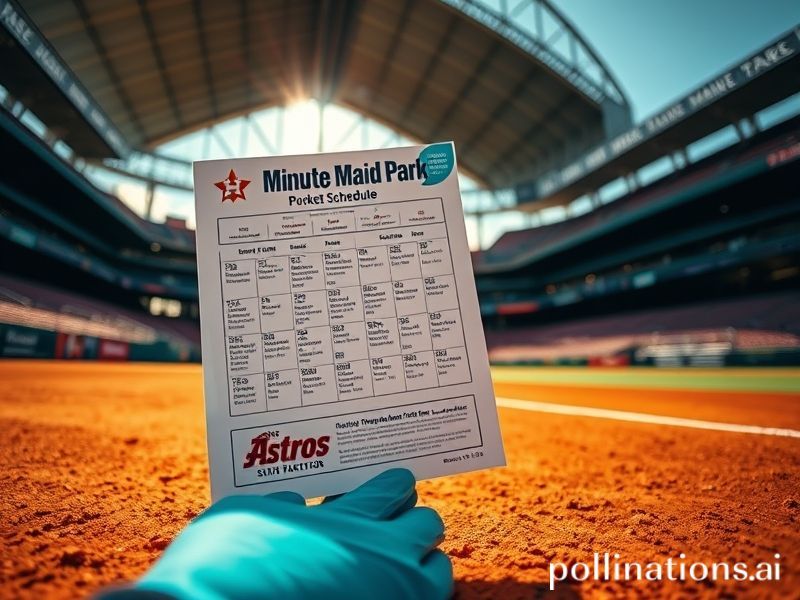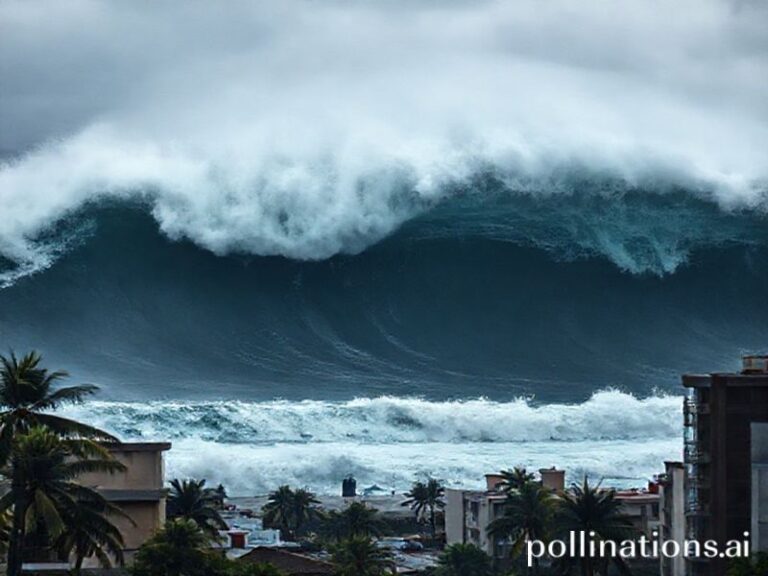How the Astros Schedule Quietly Runs the World Economy (and Other Party Tricks)
The Astros Schedule as Geopolitical Tarot
A cynical guide to why 162 games in fly-over states still make the planet wobble
By the time the Houston Astros’ 2024 schedule was released at dawn Houston-time—an hour that exists only so oil traders can pretend the sun rises on their spreadsheets—five different time zones had already priced the implications into sovereign debt. In Tokyo, the Ministry of Finance noted that the Astros open on the road in hostile American League West ballparks, pushing crude-futures volatility to its highest since the last time someone mispronounced “Astrodome.” In Lagos, a currency trader shrugged, “Fewer home dates in April means fewer private-jet layovers at Hobby Airport—good for the naira, bad for champagne imports.” Even the Swiss, who usually yawn until someone mentions hidden bank accounts, marked the All-Star break as a potential flashpoint: if the Astros rest their starters, the franc could strengthen on safe-haven flows. Baseball, it turns out, is the only sport whose schedule doubles as a Moody’s credit outlook.
The calendar itself is a masterpiece of bureaucratic surrealism. The Astros will play 52 games before May Day, a holiday still celebrated in countries that can’t afford May Two. Twenty-three contests start after 9 p.m. local time, which translates to 4 a.m. in London—perfect for British insomniacs who need something louder than Brexit reruns. Meanwhile, in Seoul, schoolchildren set alarms for first pitch so they can brag about their sleep deprivation on TikTok. Somewhere in Brussels, a Eurocrat drafts regulations on youth screen time and wonders why East Asian middle-schoolers are humming the Astros’ walk-up music. Globalization has many mothers; apparently one of them wears navy and orange.
The schedule’s travel itinerary reads like a retired cartographer’s bucket list: Arlington, Anaheim, Seattle, and the cryptic “TBD” of the postseason—destinations that sound less like cities than like failed utopias. Each flight burns roughly 5,000 gallons of jet fuel, enough to power a small Greek island until the next IMF audit. Climate activists who once glued themselves to Van Gogh now glue themselves to Minute Maid Park turnstiles, protesting the carbon footprint of José Altuve’s calves. Their placards read “Stop the Steal”—not of elections, of atmospheric stability. The irony is not lost on anyone except the front office, which responded by announcing “Green Week” sponsored by a natural-gas consortium whose logo is literally a flame.
Then there is the matter of broadcast rights, an oligopoly so Byzantine it makes the Habsburg family tree look like a straight line. MLB sells the Astros’ schedule to streaming platforms from São Paulo to Stockholm, where viewers endure four-minute ad breaks for fish oil pills and NFTs of fish oil pills. In Mumbai, a start-up offers AI-generated commentary in seventeen regional languages, including one that translates “slider” as “late-stage capitalism.” The company’s founder, a 23-year-old dropout, boasts a valuation higher than the entire Kansas City payroll, proving that while the Astros may steal signs, Silicon Valley steals reality.
And yet, for all the spreadsheets and satellite feeds, the schedule still obeys the ancient rhythms of agrarian despair: planting in spring, harvest in autumn, winter meetings to argue over who gets the last can of spray cheese. Consider the Astros’ final homestand against the Angels—a rivalry once so tepid it required federal stimulus. By then, wildfires may have renamed Los Angeles “Los Ashes,” and Houston’s own petrochemical skyline might glow extra apocalyptic for the Fox drone cameras. The broadcasters will call it “a beautiful night for baseball,” and somewhere a hedge-fund algorithm will agree, buying citrus futures on the assumption that orange skies boost orange juice demand.
When the last out is recorded sometime in October—or November, if the gods of television need an extra ad slot—billions of data points will have been harvested: exit velocities, heart rates, geopolitical anxieties. The Astros themselves will shower, board a chartered 787, and leave behind a city debating whether a ring is worth the rising sea level already lapping at I-45. The rest of us will scroll the schedule for next year, because hope, like plastic, is forever. And because nothing says “international cooperation” quite like 30 franchises agreeing to pretend the planet isn’t on the injured list.







